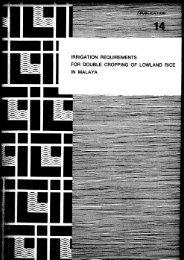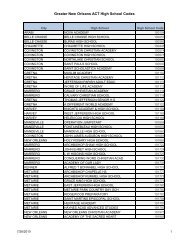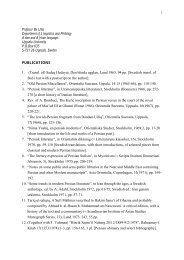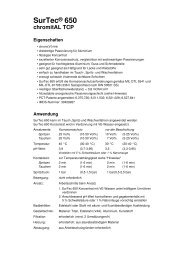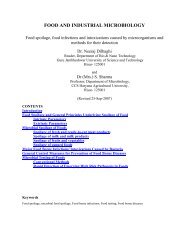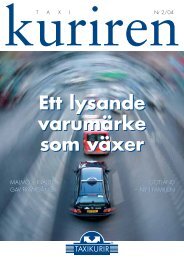On the Future of Indigenous Traditions - Munin
On the Future of Indigenous Traditions - Munin
On the Future of Indigenous Traditions - Munin
Create successful ePaper yourself
Turn your PDF publications into a flip-book with our unique Google optimized e-Paper software.
study within <strong>the</strong> country, against <strong>the</strong> state’s system <strong>of</strong> <strong>the</strong>ir governance, it will<br />
demonstrate <strong>the</strong> reasons that make <strong>the</strong>m assert <strong>the</strong>ir Adivasi identity as an indigenous<br />
people also within <strong>the</strong> preview <strong>of</strong> Martinez Cobo’s definition. 3<br />
1.1.1 Adivasis – <strong>the</strong> indigenous peoples <strong>of</strong> India<br />
It is stated in a documentary by DoCip “The Indian Summer in Geneva” 4 that <strong>the</strong><br />
“indigenous peoples <strong>of</strong> <strong>the</strong> world have never been considered by international<br />
organisations as nations with rights to land and <strong>the</strong>ir own government.” In<br />
continuation <strong>of</strong> <strong>the</strong> statement, it said <strong>the</strong>refore <strong>the</strong> rights and “human rights are<br />
considered those <strong>of</strong> individuals, not <strong>of</strong> peoples.” However, <strong>the</strong> indigenous peoples to<br />
be recognised as a people, a nation, or nations in <strong>the</strong>mselves when this was demanded<br />
by Chief Deskaha in <strong>the</strong> League <strong>of</strong> Nations in 1923 in Geneva, it “provoked a stiff<br />
response” by <strong>the</strong> modern nation-state’s members. It was only in 1982 that <strong>the</strong><br />
Working Group on <strong>Indigenous</strong> Population had met in United Nations in Geneva,<br />
where a draft Declaration on <strong>the</strong> rights <strong>of</strong> <strong>the</strong> indigenous peoples was taken in <strong>the</strong><br />
UN’s agenda under <strong>the</strong> United Nations Human Rights Commission (UNHRC) to be<br />
adopted by all its member states.<br />
It was on <strong>the</strong> eve <strong>of</strong> <strong>the</strong> adoption <strong>of</strong> <strong>the</strong> draft Declaration for <strong>the</strong> Rights <strong>of</strong> <strong>the</strong><br />
<strong>Indigenous</strong> Peoples in <strong>the</strong> United Nations, Geneva <strong>the</strong> 29 th <strong>of</strong> June, 2006 <strong>the</strong> Indian<br />
government delegation, made a statement, saying that, “India has consistently<br />
favoured <strong>the</strong> promotion and protection <strong>of</strong> <strong>the</strong> rights <strong>of</strong> <strong>the</strong> indigenous peoples” and<br />
that <strong>the</strong>y are “ready to support <strong>the</strong> proposal for adoption… and will vote ‘yes’ in its<br />
favour” <strong>of</strong> <strong>the</strong> draft Declaration to be adopted.<br />
In <strong>the</strong> last two decades <strong>the</strong> long awaited consent <strong>of</strong> <strong>the</strong> Indian government along with<br />
a few o<strong>the</strong>r governments who have until this time been opposed <strong>of</strong> <strong>the</strong> adoption <strong>of</strong><br />
this draft Declaration. However, this statement has created serious, unfavourable<br />
conditions, at least for <strong>the</strong> Adivasis <strong>of</strong> India. Mr Ajai Malhotra in his statement<br />
3<br />
Benedict Kingsbury, “‘<strong>Indigenous</strong> Peoples’ in International Law: A Constructivist Approach to <strong>the</strong><br />
Asian Controversy,” in American Journal <strong>of</strong> International Law (n.p., 1998), 419.<br />
4<br />
Volkmar Ziegler and Pierrette Birraux, “The Indian Summer in Geneva”, 1982-2000, Geneva:DoCip,<br />
n.p., CD-ROM.<br />
18





